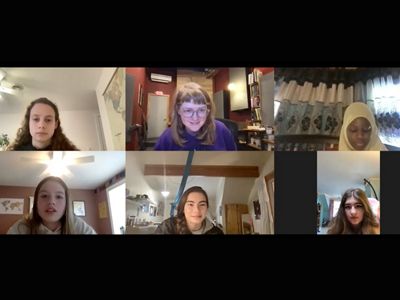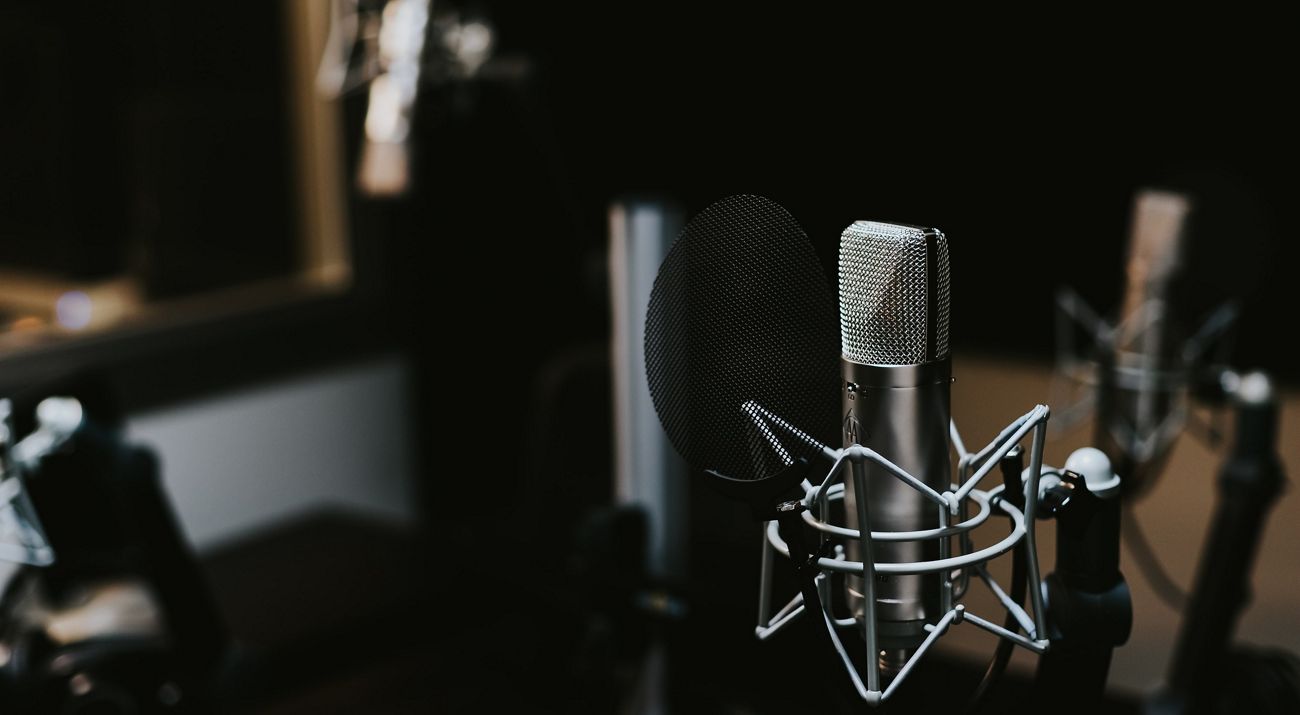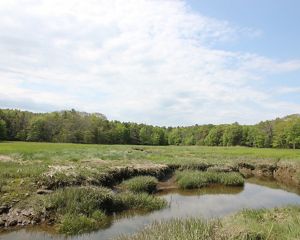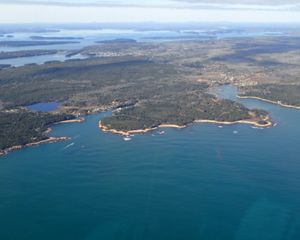Broadcasting the Next Generation
A climate-focused audio workshop teaches youth and amplifies their voices
Once Anja Bower, a senior at Portland High School in Maine, heard that fast fashion is an environmental problem, she started thinking about what it would take to reduce textile waste and extend the life of clothing and shoes.
Quinnisa Kinsella-Mulkerin, a 14-year-old from South Portland, learned about marine debris and microplastic pollution in our oceans and is now working to raise awareness about this issue.
And, Idey Adbi, a Lewiston High School senior, knows that marginalized communities often suffer the most harm from environmental damage and is now focused on increasing awareness of the effects of climate change in her own community.
As we work together to seek out innovative solutions to build our collective awareness, bolster our resilience and take action in the face of climate change, we’d do well to listen to the voices of young people like Anja, Quinnisa and Idey.
That’s why The Nature Conservancy in Maine supported a climate change audio workshop through a recent partnership with Blunt Youth Radio, the teen arm of WMPG, a community radio station broadcasting out of the University of Southern Maine. WMPG’s Blunt Youth Radio Project brings together Maine teenagers to produce audio stories and interviews on topics that matter to them.
Five teenagers, including Anja, Quinnisa, and Idey, along with Anna Ravis and Ella, participated in the 12-week workshop, learning how to interview, edit, and produce audio stories focused on climate and the environment. These youth producers handled all aspects of audio production, from story development, contacting interview subjects, reporting, and recording, to editing, on-air hosting, broadcast engineering, podcast production, and sharing and promoting finished audio pieces.
Quote: Jeremy Cluchey
So much about connecting people to nature and inspiring action on climate change is tied to the power of our stories
For the climate workshop, Blunt’s Youth Programs Coordinator Alice Anderson reached out to TNC for support.
“I was familiar with the great work happening at TNC of Maine, and I thought they would potentially be an exciting partner for Blunt Youth Radio,” explained Anderson.
Jeremy Cluchey, TNC’s director of strategic communications, jumped at the opportunity.
“So much about connecting people to nature and inspiring action on climate change is tied to the power of our stories, and audio is an incredible storytelling medium,” said Cluchey. “The fact that this program was equipping students with the skills to share their stories and inspire their peers made it an ideal partnership for us.”
Inspiring Stories
The resulting stories cover a broad range of topics: tackling the problem of plastics in the ocean, the throw-away mindset around clothing, minimizing the environmental impact of meat and dairy, and understanding who bears the burden of climate change and who is accountable for it.
“They surpassed my expectations and were so driven and critical of their work,” said Anderson of the youth producers. “They really pushed themselves and were engaged and amped about the opportunity to make their own stories and find their voice and a way to share their activism through audio.”
For her piece about textile waste, Anja spoke with a local small-business owner, who is also a teen, about her efforts to make her business sustainable and to a vice president of an international non-profit, Soles4Souls, about their efforts to divert shoes and clothing from landfills on a global scale.
“I will be majoring in environmental science and landscape architecture in college,” says Anja, “and I want to use my passion for the environment to improve the sustainability of cities and protect natural resources, while educating others on the importance of protecting our planet.”
When asked about her experience in the workshop, Anja was thoughtful about what was important for her—and for her audience.
“I enjoyed the editing process because I was able to listen again to what my interviewees had to say, and I was able to reflect better on their work to really understand the importance of sustainable businesses. I didn’t want my audio piece to be repetitive and boring so I made sure to only keep in the most impactful statements so listeners could leave with a much clearer picture of [their] work.”
Hear an excerpt from Anja's report.
Anja Bower reported on sustainable clothing practices.
Anja:
I had the opportunity to interview Josie Colton, a junior in high school who runs a small clothing business called Josie Colton Co. She crochets a variety of pieces and is here to discuss her views on sustainability and fast fashion.
Anja:
Why did you decide to start your own business?
Josie Colton:
I decided to start my own business because I have a passion for making clothes and making things in general, and so I thought it would be a good way to put that passion to use and make myself some money. Also, I'm a big lover of slow fashion. I had been making myself clothes and I thought, "Well, I bet other people would enjoy to have clothes made by someone else that's not a child in a third world country," so it seemed like a good idea.
Anja:
What are you doing to make your business as sustainable as possible?
Josie Colton:
Well, right now I have switched over from acrylic yarn to cotton, because obviously acrylic is plastic, and when you wash it in the washing machine, microplastics get into the water and therefore get into the ocean and all this awful stuff. I am in the middle of switching it over. Also, when it comes to packaging and shipping and stuff like that, I reuse every single package I get. I also reuse tissue paper and bubble wrap and all of that stuff, literally everything I can get in the package, to package up something for my business.
Anja:
How do you feel about the fast fashion industry?
Josie Colton:
Well, I kind of hate it and I kind of hate everything about it, just how toxic the mindset is that's behind fast fashion, like the idea of it's a new season, you have to get all new clothes, you have to be wearing new things, and that the trends just change so fast and that you have to get rid of everything that used to be a trend. I hate that mindset and how much waste it causes obviously. It's just such a negative system. I am a firm believer in get things that will last you your whole life, use them as long as you can, and fast fashion just is the complete opposite of that.

For her audio story, Quinnisa spoke with two ocean advocates about what motivated them to commit to their environmental work and research. Each recounted their reaction to discovering knee-deep plastic debris along the shorelines of seemingly remote places as far apart as Matinicus Island in Maine and a small island in Papua New Guinea. Both of the women Quinnisa interviewed also shared some tips about how to be involved in marine climate activism, from beach cleanups to pushing for innovations that can reduce plastic waste production.
“I learned about microplastics,” says Quinnisa. “Over time, plastic, like a water-bottle, deteriorates and the micro plastics spread everywhere, and that’s a huge problem.”
She also learned that trying to tackle a problem as overwhelming as plastic pollution in the ocean can be daunting, but understanding that lots of little actions can, when taken together, make a big difference is key to moving forward.
Idey spoke with friends and activists to understand how they feel impacted by the climate problem, who they think is responsible or should be held accountable, and what changes they want to see in their community going forward.
“My hope for my town, Lewiston, is to educate many of the immigrant families on what climate change is and why it is important.”
Asked about her future goals within the climate movement, Idey says, “For me it would be just continuing what I’m doing, and learning more about different climate change issues and topics that I’m not aware about yet, and learning about more organizations and groups.”
Hear an excerpt from Idey's report.
Anja Abdi wanted to understand how climate change effected her community.
Who is responsible or should be held accountable for climate change?
There are people in positions of power that should have done something about it before it got this bad. Even when they were told climate change is a real issue and they saw the effects of it, they still ignored it because they knew it wasn't affecting them as much as the rest of the world.
What changes do you want to see in your community regarding climate change?
Aside from more voices being included in a main narrative, I hope that as my own community here in Maine and back at home tackles the problem of climate change, we become more open-minded to how the injustices of climate change intersect with other injustices that we see in society. Too many people I personally know have been affected negatively by COVID and they are mostly low income and/or people of color. We need to remove the tunnel vision focus on just nature and realize that humans are a part of nature. And as we tackle the issues of nature, we also tackle the issues that affect other communities aside from our own.
Climate change will have a huge impact on disadvantaged communities. According to CNBC, low income communities will have higher rates of many health conditions, are more exposed to environmental hazards and take longer to bounce back from natural disasters. These existing inequalities will only be exacerbated due to climate change. Many people who live in these communities have no idea of how climate change is impacting their lives. My hope for my town Lewiston is to educate many of the immigrant families of what climate change is and why it is important and showing them the different ways that they can help.
Their full audio stories and more can be found at the Public Radio Exchange.
Elevated Voices
Asked about the success of the workshop, Blunt’s Anderson was clearly excited.
“It was a good reminder that when we have a chance to make the tools and skills of audio-building accessible, often you can take a big step back and let the stories form. I’m thrilled that there are now five more audio-empowered activists out in the world, and I hope they continue to make and share their stories.”
TNC’s Cluchey agrees. “It’s going to take all our hard work and all of our voices to meet the challenges brought on by climate change. These talented students and others like them play a critical role in fostering the social changes we need to make in our relationship to the natural world.”
Blunt Youth Radio Project has been on air for over 25 years and has won thirteen regional and national broadcasting awards. Their work has aired on various National Public Radio programs, including Marketplace and This American Life, the BBC, and many stations around the country through the Public Radio Exchange. The program can be heard on Tuesday nights from 7:30 p.m.-8:30 p.m. ET on WMPG-FM, community radio from the University of Southern Maine.



